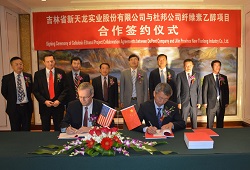 DuPont and Chinese company New Tianlong Industry Co. (NTL) have signed an historic deal that will bring cellulosic ethanol to China. This DuPont news release says the agreement allows NTL to license DuPont’s cellulosic ethanol technology and use DuPont Accellerase enzymes to produce renewable biofuel from the leftover biomass on Jilin Province’s highly productive corn farms.
DuPont and Chinese company New Tianlong Industry Co. (NTL) have signed an historic deal that will bring cellulosic ethanol to China. This DuPont news release says the agreement allows NTL to license DuPont’s cellulosic ethanol technology and use DuPont Accellerase enzymes to produce renewable biofuel from the leftover biomass on Jilin Province’s highly productive corn farms.
Combining NTL’s ethanol production expertise with processing technology, technical support and world-class enzymes supplied by DuPont, NTL will be able to produce cellulosic renewable fuel for the rapidly growing Chinese liquid biofuel market, which is projected to exceed 1.7 billion gallons per year by 2020.
“As we bring online the largest and most sophisticated cellulosic facility in the world in the State of Iowa in the United States, we are simultaneously working with leaders who share the same vision of producing the next generation of clean renewable fuels in their region,” said Jan Koninckx, global biofuels leader for DuPont Industrial Biosciences. “We are honored to have found such a strong partner in NTL. The company’s reputation for producing world-class grain ethanol makes it a superior candidate to put DuPont’s advanced technology to work to realize the additional economic and environmental benefits of cellulosic biofuel in China.”
“With its history of scientific innovation, collaboration and commitment to the ethanol industry, DuPont is an ideal partner for New Tianlong in our quest to bring the cleanest renewable fuel on the planet to China,” said SUN Guojing, general manager of NTL. “We look forward to working with DuPont over the coming years as we develop the biomass supply chain, construct a world-class facility, and produce fuel that delivers on the promise of reduced pollution and greenhouse gases. This project will augment our current excellent grade ethanol offerings and business and will make NTL the preeminent biofuel product supplier in China.”
This deal is expected to fill China’s aggressive goals for renewable energy, cutting its reliance on foreign oil and increasing employment opportunities for its large rural population.

